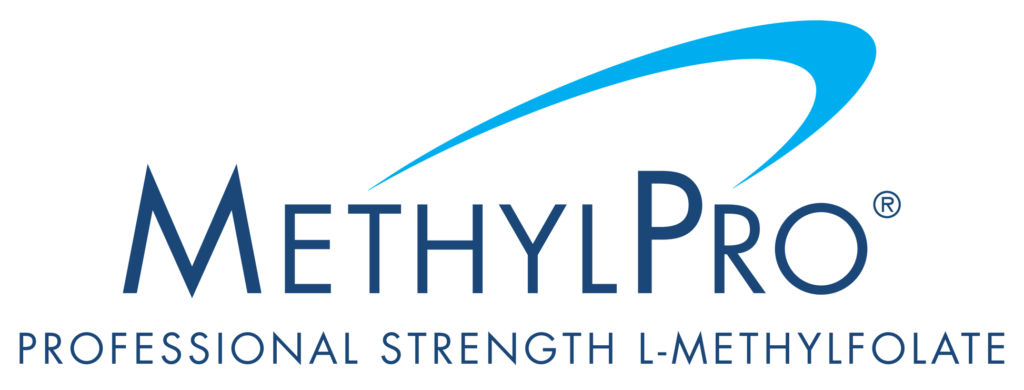We talk about L-methylfolate in the context of “methylation” all the time in our MethylPro® messaging, but what does methylation really mean? Understanding this fundamental process can help you better appreciate how it affects everything from your mental clarity to your heart health—and why proper nutrition is so important for keeping it running smoothly. We love L-methylfolate for obvious reasons, but it cannot function alone. Here we will explain methylation and our picks for the top 5 nutrients for healthy methylation.
What is Methylation?
Methylation is a biochemical process that involves adding a methyl group (one carbon atom bonded to three hydrogen atoms) to a molecule in your body, such as an enzyme, neurotransmitter, or vitamin. Once a molecule has been methylated, it is “activated” and ready to perform its biological function.
Methylation happens trillions of times a second in your body and is critical for maintaining your health. Here are just some of the processes that rely on healthy methylation:
- Cell Division: Enabling growth and tissue repair [1,2].
- DNA Repair: Fixing damaged DNA to maintain genetic integrity [1].
- Gene Expression: Turning genes on and off to control cellular function [1].
- Fetal Development: Supporting healthy growth and cell differentiation in the womb [2].
- Brain Health: Supporting mental clarity, focus, and emotional balance [3].
- Neurotransmitter Production: Balancing mood and cognitive function [3].
- Homocysteine Regulation: Converting homocysteine into safer compounds to protect cardiovascular health [4].
- Immune Regulation: Supporting a balanced immune response [5].
- Metabolism: Effectively converting nutrients into energy [6].
- Detoxification: Removing toxins and waste products from the body [7].
- Skin Health: Promoting quick healing and youthful, healthy skin by supporting cellular repair [8,9].
Nutrients That Power the Methylation Cycle
For methylation to work efficiently, your body requires specific nutrients that act as cofactors or methyl donors. Unfortunately, modern diets or genetic factors can leave many people running low on these vital nutrients. Here’s a closer look at the key players:
Methylation-Supportive Nutrients
- Folate (B9): Donates and accepts methyl groups, with its active form, L-methylfolate (5-MTHF), playing a critical role.
- Vitamin B12 (Cobalamin): Converts homocysteine back into methionine, completing the methylation cycle.
- Vitamin B6 (Pyridoxine): Supports enzymatic reactions within the methylation cycle.
- SAMe (S-Adenosylmethionine): A universal methyl donor that fuels numerous methylation processes.
- Magnesium: Acts as a cofactor for methylation enzymes, ensuring smooth functioning.
Why Supplementation Might Be Necessary
Certain genetic variations, like mutations in the MTHFR gene, can hinder the body’s ability to activate folate and other nutrients, making supplementation with methylated forms optimal. Lifestyle factors like poor diet, stress, and environmental toxins can also strain your body’s methylation processes.
Supporting Your Methylation with MethylPro®
At MethylPro®, we specialize in creating high-quality supplements designed to support optimal methylation. Our products feature bioavailable, methylated forms of key nutrients, ensuring they are ready for your body to use without additional conversion steps.
Recommended Products for Methylation Support
- MethylPro® B-Complex + L-Methylfolate: Provides activated forms of B vitamins, including methylfolate and methylcobalamin (B12), to support balanced homocysteine levels, brain health, and energy production.
- MethylPro® Multivitamin + L-Methylfolate: Combine your favorite dose of L-methylfolate with methylated B vitamins and a full spectrum of essential nutrients for comprehensive support.
- MethylPro® Cofactors + L-Methylfolate: This formula contains L-methylfolate and its methylation cofactors: B12, B6, and magnesium.
- Metabolic Maintenance® SAMe with Cofactors: Our sister supplement brand offers a SAMe supplement that includes SAMe, plus it’s nutrient cofactors in powerful doses.
Is Your Methylation Running Smoothly?
If you experience exhaustion, brain fog, mood swings, or signs of premature aging, it may be worth evaluating your methylation health. By supplying your body with the nutrients it needs, you can optimize this vital process and enjoy better overall well-being.
Take the first step toward better health by exploring MethylPro®’s range of supplements tailored to support healthy methylation at its core.
References
- https://link.springer.com/article/10.1007/S13237-021-00367-Y
- https://link.springer.com/article/10.1007/s43032-022-00989-w
- https://www.mdpi.com/1422-0067/24/3/2346
- https://iovs.arvojournals.org/article.aspx?articleid=2796286
- https://www.frontiersin.org/journals/immunology/articles/10.3389/fimmu.2021.696280/full
- https://academic.oup.com/jcem/article/106/10/e3837/6313210
- https://www.sciencedirect.com/science/article/abs/pii/S0960852423011021
- https://onlinelibrary.wiley.com/doi/full/10.1111/exd.14325
- https://onlinelibrary.wiley.com/doi/full/10.1002/ski2.410

